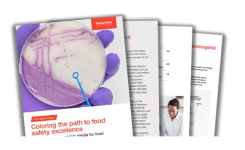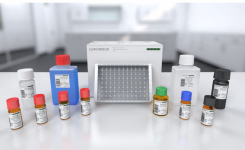AFNOR Approves Thermo Scientific Salmonella Rapid Test
go back to news archives| | The Thermo Scientific Salmonella Rapid Test (OSRT, product code FR0201A), a novel culture method for faster identification of Salmonella species from food and environmental samples, has been successfully revalidated and approved for use by the internationally-recognised French accreditation body, AFNOR (l’Association Francaise de Normalisation). |
| In an extensive study, involving 820 samples examined at nine independent food laboratories throughout Europe and the United States, OSRT demonstrated 96.8% sensitivity, compared to 90.1% for traditional methodology. This rapid test is widely used in food laboratories around the world. In addition to AFNOR, it has also received approval from other regulatory bodies, including AOAC (Association of Analytical Communities) International. |
Source : Thermo Scientific. View archived contact details
Posted on August 4, 2005
















